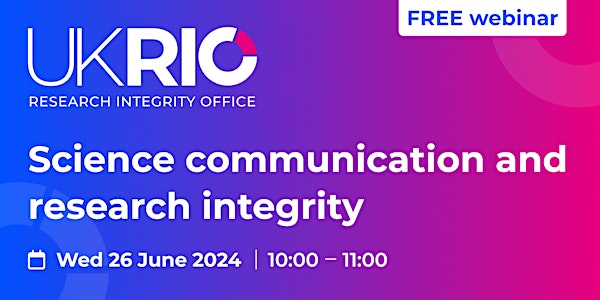
Science communication and research integrity
Science communication and research integrity
Date and time
Location
Online
About this event
- 1 hour
This is the latest in the series of regular free webinars from the UK Research Integrity Office on research integrity and related issues.
Is research integrity relevant to science communication, aka scicomm, i.e., the communication of science beyond researchers? Our speakers will discuss how scicomm should consider the rigour of the original research and its publication process, including any peer review, and how the principles of publication ethics may apply to scicomm, e.g., accuracy, transparency, and declaration of interests.
SPEAKER
Dr Stephen Webster, Senior Lecturer in Science Communication, Imperial College London and Director of The Good Science Project
SPEAKER BIOGRAPHY
Dr Stephen Webster, Senior Lecturer in Science Communication, Imperial College London and Director of The Good Science Project
I am director of The Good Science Project, an ethics and research culture initiative run from Imperial’s Office of the Vice-Provost (Research and Enterprise). Before this, from 2008 to 2023, I was director of Imperial’s Science Communication Unit, where I taught the philosophy of science, and ethics, on the Unit’s masters course.
My first degree was in zoology. My PhD was in the philosophy of science, most particularly the boundary aspects of the art-science interface. Before entering academia I was a school science teacher for 13 years, working in London schools.
My current work, The Good Science Project, seeks to elaborate the ethical foundations of the contemporary debate about research culture. In particular I am interested in the idea of science as necessarily a communicative process, where scientists thrive best in congenial and trusting environments, with a good degree of autonomy. Through regular in-person discussion meetings – the Friday Forums – and through larger gatherings such as our conference The Day of Doubt, the project aims to give scientists the chance to step back from their pressing schedules, and consider different perspectives on ‘daily science’. Our current project is an arts initiative, The Triptych of Science, where Imperial scientists are working with artist-in-residence Ella Miodownik to find new ways of representing ordinary, daily, laboratory life.
I also have a background in broadcast radio and in science writing.
For further information on this event or future events at UKRIO please follow the UK Research Integrity website.